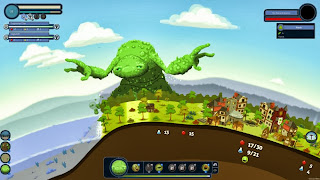Monday, 4 November 2013
PPP2 Review: Reus
I came across this little game while exploring the Steam catalog and decided to give it a go. Reus is a game in which you play as a small planet that has nothing but waste land on it to begin with until the giants come along. We then take control of 4 giants. Water, forest, mountain/desert and swamp making giants. With there help we are able to create thriving villages and keep them happy by providing them with food, wealth and technology depending on what they want.
Some types of villages are quite predictable with what they want to build. For example forest villages generally start by building things that require food so you take up all the patches that are inside their village borders and dedicate it to making food. When the game begins to advance further in the 120 minute eras is when this technique doesn't end up doing so well as they want things that sometimes require not only a shed load of food but also a shed load of technology and wealth too. This is where the symbosis part of the game comes into play. Not only are the giants used to create stronger plants, animals and minerals but there is also more that can be done. Symbosis is all about looking at the different attributes of the patch as say some animals will thrive better when next to a particular plant which will mean more will be produced for the village. But be warned... give the villagers too much and they can turn greedy. When this happens the villagers will start to demand more from the giants and will be more likely to start wars on neighbouring villages or even the giants themselves.
The gameplay is wonderful and simple and easy to get the hang of due to the simple controls. The giants have been well created and look brilliant even though they are very simple but each have there own unique look and abilities that influence how the world is developed. It is also wonderful to see how the villages grow over time in the different environments. If you zoom into the villages you can see the ridiculous things that the villagers are thinking about like playing the saxophone... even though the game is clearly set during early civilisation. But these little touches add more life to the game and make it even more enjoyable to play.
To sum up, this game is fantastic and relaxing. With a long time limit on the era to think about, players can relax and thing about how to make there villages the best that they can possibly be without making the villages greedy and think about starting a war... unless that's what they want to happen?
Subscribe to:
Post Comments (Atom)





No comments:
Post a Comment